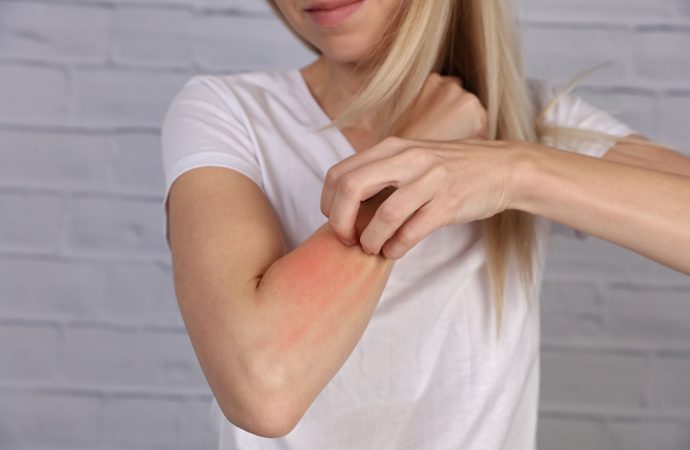Introduction It’s a scenario many of us have experienced: you’re finally settling down for the night, ready to drift off into peaceful slumber, when suddenly, an irresistible urge to scratch strikes. Nighttime itching can be not only irritating but also disruptive to your sleep and overall well-being. In this comprehensive guide, we delve into the
Introduction
It’s a scenario many of us have experienced: you’re finally settling down for the night, ready to drift off into peaceful slumber, when suddenly, an irresistible urge to scratch strikes. Nighttime itching can be not only irritating but also disruptive to your sleep and overall well-being. In this comprehensive guide, we delve into the various causes of nighttime itching, shedding light on why it occurs and what you can do to find relief. Explore More About (Eye Twitching)
Understanding Nocturnal Pruritus
What is Nocturnal Pruritus?
Nocturnal pruritus, or nighttime itching, refers to the sensation of itchiness that predominantly occurs during the night. While itching can happen at any time of the day, it often intensifies in the evening and throughout the night, leading to discomfort and sleep disturbances.

Image by: yendex.com
Common Causes of Nighttime Itching
Dry Skin
One of the most prevalent causes of nighttime itching is dry skin. Especially during the winter months or in arid climates, the skin may lose moisture, leading to flakiness, tightness, and itching, particularly at night when the body’s temperature tends to drop.
Allergic Reactions
Allergens present in your bedroom environment, such as dust mites, pet dander, or certain fabrics, can trigger allergic reactions, resulting in itching during the night. Individuals with sensitivities to these allergens may experience exacerbated symptoms when lying in bed, making nighttime itching a common occurrence.
Skin Conditions
Various skin conditions, including eczema, psoriasis, and dermatitis, can manifest with intense itching, which may worsen at night. These conditions are often characterized by inflammation, redness, and the formation of dry, scaly patches on the skin, contributing to nocturnal pruritus.
Insect Bites and Infestations
Insect bites, such as those from mosquitoes or bedbugs, can cause localized itching that tends to intensify at night. Additionally, infestations of parasites like scabies or lice can lead to persistent itching, particularly in areas where these pests are most active, such as the scalp, neck, or hands.
Systemic Conditions
Certain systemic conditions, such as kidney disease, liver dysfunction, or thyroid disorders, may present with symptoms of itching, including nocturnal pruritus. These underlying health issues can disrupt normal physiological processes, leading to skin abnormalities and sensations of itchiness, especially at night.

Image by: yendex.com
Managing Nighttime Itching
Moisturize Regularly
To combat dry skin and alleviate nighttime itching, regular moisturization is essential. Opt for fragrance-free, hypoallergenic moisturizers that provide long-lasting hydration without clogging pores or exacerbating skin sensitivities. Apply moisturizer liberally after bathing and before bedtime to seal in moisture and soothe irritated skin.
Identify and Eliminate Allergens
If allergies are contributing to nighttime itching, take steps to identify and eliminate potential allergens from your bedroom environment. Use allergen-proof mattress and pillow covers, wash bedding in hot water weekly, and keep pets out of the bedroom to minimize exposure to pet dander. Additionally, consider using an air purifier to filter out airborne allergens and improve indoor air quality.
Seek Medical Evaluation
If nighttime itching persists despite home remedies or is accompanied by other concerning symptoms, such as rash, swelling, or fever, it’s important to seek medical evaluation. A dermatologist or healthcare provider can perform a comprehensive assessment to identify the underlying cause of nocturnal pruritus and recommend appropriate treatment options.
Practice Good Sleep Hygiene
Maintaining good sleep hygiene can help minimize nighttime itching and improve overall sleep quality. Establish a relaxing bedtime routine, avoid stimulating activities and electronic devices before bed, and create a comfortable sleep environment conducive to restful sleep. Additionally, consider using calming techniques such as meditation or deep breathing exercises to reduce stress and promote relaxation before sleep.

Image by: punchng.com
Medications and Topical Treatments
In some cases, medications or topical treatments may be prescribed to alleviate nighttime itching associated with underlying skin conditions or systemic disorders. Antihistamines, corticosteroids, and emollients are commonly used to relieve itching and reduce inflammation, providing symptomatic relief and improving sleep quality.
| Causes of Nighttime Itching | Description |
|---|---|
| Dry Skin | Loss of moisture in the skin, leading to flakiness and tightness, exacerbated at night. |
| Allergic Reactions | Response to allergens such as dust mites or pet dander, resulting in itching during the night. |
| Skin Conditions | Conditions like eczema or psoriasis characterized by inflammation and dry, scaly patches on the skin. |
| Insect Bites and Infestations | Itching caused by insect bites like mosquitoes or infestations of parasites such as scabies or lice. |
| Systemic Conditions | Underlying health issues like kidney or liver dysfunction, contributing to sensations of itchiness, especially at night. |
Conclusion
Nighttime itching can significantly impact your quality of life, disrupting sleep and causing discomfort. By understanding the underlying causes of nocturnal pruritus and implementing targeted management strategies, you can effectively alleviate itching and enjoy restful nights once again. From moisturizing to identifying allergens and seeking medical evaluation when necessary, proactive measures can help you regain control over nighttime itching and achieve better sleep outcomes.
Remember, addressing nighttime itching requires a multifaceted approach that addresses both skin health and underlying medical conditions. By prioritizing self-care and seeking professional guidance when needed, you can overcome nocturnal pruritus and wake up feeling refreshed and rejuvenated each morning.
Don’t let nighttime itching disrupt your sleep any longer. Take proactive steps today to uncover the underlying causes and reclaim your nights from itching and discomfort.
















